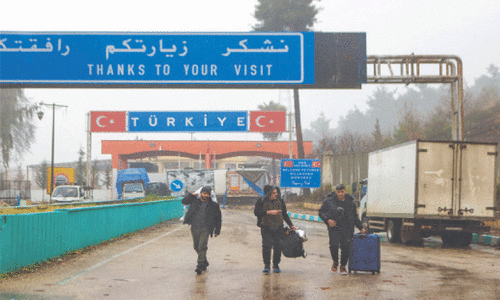DOHA, June 22: Western and Arab opponents of Bashar al-Assad met in Qatar on Saturday to tighten coordination of their stepped up support for rebels battling to overthrow the Syrian president.
Ministers from 11 countries, including the United States, European and regional powers, held talks that Washington said should commit participants to direct all aid through the Western-backed Supreme Military Council, which it hopes can offset the growing power of jihadist rebel forces.
After a series of military offensives by Assad’s troops, including the recapture of a strategic border town two weeks ago, President Barack Obama said the United States would increase military support for the rebels.
Two Gulf sources said on Saturday that Saudi Arabia, which has taken a lead role among Arab opponents of Assad, had also accelerated delivery of advanced weapons to the rebels.
“In the past week there have been more arrivals of these advanced weapons. They are getting them more frequently,” one source said, without giving details. Another Gulf source described them as “potentially balance-tipping” supplies.
Rebel fighters say they need anti-aircraft and anti-tank weapons to stem the fightback by Assad's forces in a civil war that has already killed 93,000 people and driven 1.6 million refugees into neighbouring countries.
The increasingly sectarian dynamic of the war pits mainly Sunni fighters against forces loyal to Assad, from the Alawite minority.
Qatar’s Prime Minister Sheikh Hamad bin Jassim al-Thani, whose country has been one of the most open backers of the anti-Assad rebels, said that supplying them with weapons was the only way to resolve the conflict.
“Force is necessary to achieve justice. And the provision of weapons is the only way to achieve peace in Syria's case,” Sheikh Hamad told ministers at the start of the talks.
“We cannot wait due to disagreement among Security Council members over finding a solution to the problem,” he said. He also called on Lebanon's government to halt intervention by Lebanese factions in the neighbouring conflict. Lebanese Hezbollah guerrillas led the assault by Assad's forces to recapture the town of Qusair earlier this month.
Speaking before Secretary of State John Kerry arrived in Doha, a US official said the United States wanted to ensure that “every kind of assistance” offered by the 11 countries attending the meeting go through the Supreme Military Council, led by General Salim Idriss, a former commander in Assad's army.
A diplomat who had seen the draft communique of the meeting said it also spoke of putting pressure on Assad to allow greater access for humanitarian aid after the United Nations launched a $5 billion appeal earlier this month—its biggest ever.
But he said there was no mention of establishing a no-fly zone—a move which diplomats have said the United States was studying but which the White House has played down—or specific mention of weapons supplies to the rebels.
The meeting in Qatar brings together ministers of countries that support the anti-Assad rebels—France, Germany, Egypt, Italy, Jordan, Qatar, Saudi Arabia, Turkey, United Arab Emirates, Britain and the United States.
Western countries hope by channelling assistance through Idriss they can reduce the influence in the opposition ranks of radical Islamist groups such as the Al Qaeda-linked Nusra Front.
British Foreign Secretary William Hague reiterated that London had yet to take a formal decision on arming the rebels, but said that only by strengthening the opposition could the West hope to bring about talks for a political settlement.
“We won't get a political solution if Assad and his regime think they can eliminate all legitimate opposition by force, and so we do have to give assistance to that opposition,” he told reporters before the start of Saturday's talks.
The United States and Russia, which back opposing sides in the conflict, hope to bring them together for negotiations in Geneva originally scheduled for this month. Hague said there was little prospect of that happening “in the next few weeks”.
“This crisis is on a worse trajectory, it is set to get worse ... I don't want to underestimate the severity and the bleakness of it,” Hague said.
Moscow, which says it will not break off military supply contracts with Damascus, opposes arming rebel forces that it says include terrorist groups, and has warned that a swift exit by Assad would risk a dangerous power vacuum.
In northern Syria, rebels announced an offensive that they said aimed to capture the western districts of the city of Aleppo from government forces.
Assad's troops are have been fighting rebels in rural areas around Syria's biggest city and are believed to be reinforcing in the region, ahead of their own expected assault on rebel-held parts of the contested northern hub.
In Damascus, the army sustained its bombardment of the eastern rebel-held district of Qaboun and soldiers clashed rebels in the Barzeh district, the Britain-based Syrian Observatory for Human Rights said.
Before his departure from Washington, Kerry spent on Thursday briefing Congress on the administration's Syria plans, with some lawmakers pressing for the United States to do more and others decrying any deeper involvement in the civil war.
Having withdrawn US troops from Iraq and working to wind down American forces in Afghanistan, some lawmakers are wary of getting involved in another costly conflict. Some worry that the weapons could end up in the hands of radical Islamist groups who could one day use them against Western interests.
Until now the United States has been providing non-lethal aid—food and medicine — to the rebels.—Reuters













































Dear visitor, the comments section is undergoing an overhaul and will return soon.